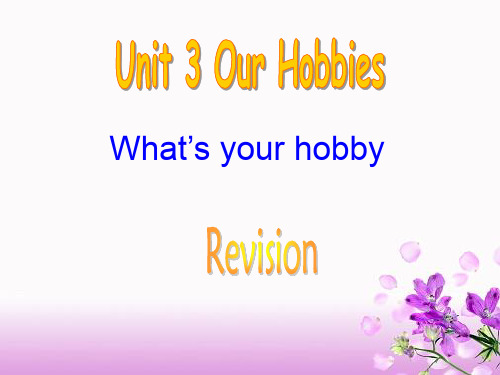仁爱版英语八年级上册主要语法点及练习 课件 (共40张PPT)
仁爱新版英语八年级上册unittopic复习课件PPT课件

B1.prefer_____basketball to_____model planes. A.to play; make B.playing;making C.palying;make D.play;make
used to的用法
• used to "以前常作某事,过去常过某事 • ed toபைடு நூலகம்否定形式和一般疑问句形式有两种:
perferred to die instead of stealing. 他宁死也不去偷窃. • I prefer to watch TV rather than go out.我宁愿呆在家里
也不出去.
• 3.prefer sth to sth • 4.prefer doing sth to doing sth .
·福建省专用
│ 重点突破
2 whether conj. 是否 He doesn't mind whether they're good or not. 他并不介意他们是好是坏. 点拨 常用来引导宾语从句,且能与or not连用. I don't know whether I will be able to come. 我不知道我是否能来.
他们养宠物,上网聊天或收集东西,如硬币,洋娃娃或邮票. They keep pets, chat on the Net and collect things such as coins, dolls or stamps.
你过去有什么爱好 What hobbies did you use to have
1She had told me a lot about how to learn English well. 她告诉我许多有关怎样学好英语的方法. 2Thanks a lot.非常感谢. 另外,a lot of 和lots of 的意思也是许多、大量,要用在名词前,在肯 定句中常代替much,many.在口语中尤其如此.如: There are a lot of / lots of history books in the room.屋里有许多 历史书. There is still a lot of / lots of snow on top of the house.房上仍有 许多雪. a lot of和lots of之间没有多大区别,都可以与可数名词和不可数名 词连用.与不可数名词连用时,动词用单数,与可数名词连用时,动词 用复数.
仁爱英语八年级上册知识点PPT课件

3
Unit 1 Playing Sports
Topic 1Are you going to play basketball?
7. at least
至少
8. be good at
善于做某事
9. take part in
参加
10. all over the world
全世界
11. be good for
[类似的有watch,hear,feel 等这类感观 动词.]
7
重点语言点
20. join sb. 表示 “加入某人的行列” “和某 人在一起”
join + 组织 表示 “加入某个组织” take part in 表示 “参加/出席某个活动” 如: Will you join us? I will join the skiing club. She is planning to take part in the high
I prefer skating. = I like skating better. 我更喜 欢滑雪.
15. Do you skate much? = Do you often skate? 你常滑雪吗?
16. She spends at least half an hour in the gym every day. 每天她至少花半小时在体育馆.
jump.
8
重点语言点
21. leave… 离开…… leave for… 动身去…/离开到… 如: They are leaving Beijing tomorrow.
明天他们要离开北京. They are leaving for Japan the day after
tomorrow. 后天他们要前往日本. 22. how long 表示“多久(时间)”; 提问时
仁爱版八年级上英语教材梳理复习课件

学句型·写易
常考句型 1.I'm going to play basketball.我要去打篮球。(P1) 句型结构 be going to do...将要/打算做…… 句型应用 (1)这个暑假我要去参观长城。 I'm going to visit the Great Wall this summer holiday . (2)我将来打算成为一名科学家。
拓展 see sb. doing sth.看见某人正在做某事,表示宾语的动作正在进行。如: I saw him playing basketball in the playground. 我看见他正在操场上打篮球。
2.Which sport do you prefer, swimming or rowing? 游泳和划船,你更喜欢哪项运动?(P2) 基本用法 prefer v.宁愿,更喜欢,其后可接名词、动名词或动词不定式。如: I prefer English.我更喜欢英语。 She prefers singing.她更喜欢唱歌。 拓展 prefer...to...与……相比更喜欢……,后接名词或动名词。如: I prefer dogs to cats.与猫相比,我更喜欢狗。
A.spent B.cost C.took D.paid
(4)Linda
200 yuan for a bike. ( D )
A.spent B.cost C.took D.paid
3.host/hold 1)host意为“做主人招待,举办,主办”,指由多个单位或团体联合举行的某一 活动交由某一单位具体组织。如: South Africa hosted the World Cup finals.南非主办了世界杯决赛。 2)hold意为“召开,举行”,主语既是承办者,又是参与者,是本单位或团体内 部自主举行的活动。如: hold a sports meet举行运动会。
仁爱版英语八年级上册主要语法点及练习 课件 (共40张PPT)精编版

2. I think ____a foreign language is not easy. You should ___ it often.
A. to learn; to practice B. learning; practice
C. learn; practicing
仁爱八年级上册主要语法点复 习及练习题 德化三中
There be句型的一般将来时
1. There __ an English party in our class next week.
A. is going to have B. is going to be
C. will have
D. have
2. There ___ a football match next week. Shall we go and watch it?
1. —What’s your hobby, please? —I ____ dancing.
A. am fond of B. enjoy
C. prefer
D. A, B and C
2. — Does your father like collecting stamps?
— He isn’t ___ it . He is ___ collecting old clocks .
--ed,--ing
1. All the Chinese were __ when they heard Liu Xiang won the first. It was really ______. A. exciting, excited B. excited, exciting C. exciting, exciting D. excited, excited
英语八年级上册语法知识点仁爱版

英语八年级上册语法知识点仁爱版一、一般现在时1. 概念:表示经常发生的动作或存在的状态。
2. 构成:动词原形或第三人称单数形式。
3. 用法:表示经常性、习惯性的动作或存在的状态,也表示现在的特征或状态。
如:He often helps his mother do the housework. 他经常帮他妈妈做家务。
4. 特殊用法:表示主语具备的性格和能力,也可以表示客观事实或普遍真理。
如:She can sing this song in English. 她能用英语唱这首歌。
二、现在进行时1. 概念:表示正在进行的动作或存在的状态。
2. 构成:be动词(am/is/are)+动词的现在分词形式(-ing)。
3. 用法:表示正在进行的动作或存在的状态,强调的是正在发生的事情。
如:They are studying in the classroom. 他们在教室里学习。
4. 特殊用法:表示将来发生的动作,也可以表示过去发生的动作。
如:He is coming to see you tomorrow. 他明天要来看你。
(表示将来) They were having a meeting at this time yesterday. 昨天这个时候他们在开会。
(表示过去)三、现在完成时1. 概念:表示已经完成的动作或存在的状态,对现在产生的影响或结果。
2. 构成:have/has + 过去分词。
3. 用法:表示过去发生的动作已经完成,对现在产生的影响或结果。
如:I have finished my homework. 我已经完成了我的作业。
4. 特殊用法:可以表示发生在过去的动作延续到现在,也可以表示过去发生的动作与现在的状态有关。
如:He has lived here since 2000. 他从2000年就住在这里了。
(表示过去的动作延续到现在)They have been married for five years. 他们结婚已经五年了。
仁爱版英语八年级上册主要语法点及练习 课件 (共40张PPT).ppt

B. When
C. How much
D. How often
2. — ___ have you been like this?
—Three days.
A. How long B. How soon
C. How often D How many
3.翻译:你作业做了多长时间?
How long did you do your homework?
2.You should not eat __ meat. It can make you fatter.
A. too many B. too much
C. much too
D. many too
动词词组做主语,动词要用?形式 谓语动词用?数
1.—Watching TV too much __ bad for your eyes. —I’ll go to bed right away.
2. ____ necessary for us _____ English well.
A. This is; to learn B. It’s; to learn
C. It’s; learn
D. That’s; learn
主将从现
• If(如果) ,as soon as(一…就…)
1. If it ____ tomorrow, we will go to the park.
1.—Would you mind ___here?
—I’m sorry about that. I’ll go somewhere else.
A. no smoking B. not smoking
C. no smoke
D. not smoke
仁爱版英语八年级上册主要语法点及练习 共40张

How long did you do your homework?
仁爱版英语八年级上册主要语法点
9
及练习 共40张
1. Don’t shout at him. He is only _______ boy. A. a eight-year-old B. an eight-year-old C. a eight years old D. an eight years old
A. am going C. am
B. am going to D. going to
仁爱版英语八年级上册主要语法点
4
及练习 共40张
Would you mind用法
1.Would you mind (not)doing sth? 2. Would you mind if +从句(如果我做…你会介意吗) 3.Would you please(not) do sth? 4.Could you please (not) do sth?
—_______
A. Oh, it doesn’t matter. B. You’re welcome.
C. That’s OK.
D. Thank you all the same.
仁爱版英语八年级上册主要语法点
8
及练习 共40张
How often, how long
1. —___do you play computer games?
—Every ni
C. How much
D. How often
2. — ___ have you been like this?
—Three days.
A. How long B. How soon
仁爱八年级英语上册

仁爱八年级英语上册一、重点语法。
1. 一般将来时。
- 结构:will+动词原形(表示将来某个时间要发生的动作或存在的状态)- 例如:I will go to Beijing next week.- be going to+动词原形(表示打算、计划做某事或根据某种迹象表明即将发生某事)- 例如:It is going to rain. Look at the dark clouds.2. 形容词的比较级和最高级。
- 比较级的构成:- 一般在形容词词尾加 -er,如:tall - taller。
- 以不发音的e结尾的形容词,加 -r,如:nice - nicer。
- 以重读闭音节结尾且末尾只有一个辅音字母的形容词,双写这个辅音字母再加-er,如:big - bigger。
- 多音节形容词和部分双音节形容词,在前面加more,如:beautiful - more beautiful。
- 比较级的用法:- 用于两者之间的比较,常用结构:A+be+比较级+than + B。
例如:Tom is taller than Jack.- 最高级的构成:- 一般在形容词词尾加 -est,如:tall - tallest。
- 以不发音的e结尾的形容词,加 -st,如:nice - nicest。
- 以重读闭音节结尾且末尾只有一个辅音字母的形容词,双写这个辅音字母再加-est,如:big - biggest。
- 多音节形容词和部分双音节形容词,在前面加most,如:beautiful - most beautiful。
- 最高级的用法:- 用于三者或三者以上的比较,常用结构:A+be+the+最高级+in/of+范围。
例如:Mount Everest is the highest mountain in the world.3. 宾语从句。
- 宾语从句的语序为陈述句语序。
- 连接词:- 当从句为陈述句时,连接词用that(可省略)。
初中英语英语八年级上册知识点梳理ppt 仁爱版优秀PPT课件

•享受做某事的乐趣 •练习做某事 •完成做某事 •坚持做某事 •继续努力 •使某人坚持做某事 •保证安全 •帮助某人 •擅长,在---方面做得好 •到处乱扔 •其他某个地方
•enjoy doing--•practice doing--•finish doing--•keep doing--•Keep trying! •keep sb. doing--•keep safe •help sb. /give sb. a hand •be good at--- /do well in--•throw--- around /throw--- about •somewhere else
•刚才我看见他正在体育馆里做锻炼。 •I saw him exercising in the gym just now.
•游•W泳hic和h s滑po冰rt d相o y比ou,pr你efe更r, s喜wim欢m哪ing项o运r sk动ati?ng我? I更pre喜fer欢游泳。
swimming . •Which sport do you like better, swimming or skating? I like swimming better.
新版仁爱英语八年级上册
知识点梳理
2016 01 16
打算做某事 看见---做--看见---正在做--在暑假期间 为某人加油 两者都 常常,相当经常 更喜欢 更喜欢做--与---相比更喜欢--最喜欢
Unit 1,Topic1知识点
一、重点短语
•be going to do--- /plan to do--•see --- do--•see ---doing--•during the summer holidays •cheer--- on •both--- and--- /both of--•quite a bit/quite a lot/very often •prefer /like --- better •prefer doing--- /prefer to do--•prefer A to B •favorite /like ---best
(共8套)仁爱版八年级英语上册(全册)复习知识点全集PPT课件汇总

b
vvv
vvv
vv
v
v
v
v
v
vv
vv
vv vv vv
vv vv vv
vv vv
vv
v vv
vv vv
vv
vv
vv vv
vv
v v v
v
v
v
v
v
v
v
v
v
v
v
v
v
v
v
v v
v
v
v
v
文章见《高分突破—中考总复习》第43页
v v
v v v
v v
v v v
文章见《高分突破—中考总复习》第44页
一次小下载 安逸一整年!
(共8套)仁爱版八年级英语上册(全 册)复习知识点全集PPT课件汇总
如果暂时不需要,请把我收藏一下。再次搜索 到我的机会不足万分之一哦!
小魔方站作品
文章见《高分突破-中考总复习页
vvv vvv vvvv
vvv
vvv
vvv
vvv
vvv
vvv vvv
vvv
vvv
vvv vvv
vvv
vvv
vvv
vvv
vvv
vvv
vvv
vvv
vvvv
vvvv
vvvv
vvvv
vvvv vvvv vvvv
vvvv
vvvv vvvv vvvv
vvvv vvvv
vvvv vvvv vvvv
vvvv vvvv
vvvv vvvv vvvv vvvv vvvv vvvv vvvv
vvvv vvvv
vvvv vvvv
仁爱版八年级上英语语言点课件

Could you give him a
hand?
give sb. a hand 帮助某人
Sure! What is it?
Would you mind doing sth? 你介意做某事吗?
Would you mind teaching him English?
Not at all.
➢But one of my teammates fell ill.
most people like it.
she/swim the day after tomorrow help to keep her heart and lungs healthy
保持健康 a good way to keep fit
A: What is she going to do the day after tomorrow? B: She is going to swim. A: Why? B: Because it helps to keep her heart and lungs healthy
4. It’s more important for you and other players to play as a team. 对于你和你的队友来说,团队协作更重要。
It’s + adj.+for sb.+to do sth. 意为:对某人做某事很……
Translate the phrases into English.
Eg: 在中国,红色代表着幸运。 Red stands for luck in China.
至少: at least
轮流:
in turn
越来越受欢迎: more and more popular
八年级英语上册Unit4语法专项课件(形容词比较级和最高级)最新仁爱版

易错点1
常见的用来修饰比较级的副词
形容词比较级前可用a lot/far/a bit/much/even/still等词来修饰, 表示“……得多”,“更……”,“……一些”。very, really, so, too, rather, pretty, quite等词后只能用原级。 The problem is a lot more difficult than that one. 这道题比那道题要难得多。 He is so careless that he loses the purse. 他是如此粗心以至于弄丢了钱包。
比较级和最高级的常见用法
用法
比较级
例句
Our country is becoming stronger (4)“ 比较级 +and+ 比较级”表示 and stronger. “越来越……” 我们的国家正变得越来越强大。 (5)“the+ 比较级 …… , the+ 比较 The more, the better. 级……”表示“越……,就越……” 多多益善。 The taller of the two boys is my (6)the+比较级+of the two+名词复 brother. 两个男孩中,较高的那 数 一个是我的哥哥。
比较级和最高级的构成
原级 old年老的; 古老的 比较级 older较老的;较旧的 elder年长的 farther(指距离)更远的 far远的
不规则变化
最高级 oldest最老的;最旧的; 最年长的 eldest最年长的 farthest (指距离)最 远的
further(指距离和抽象概 furthest (指距离和抽 念)较深远的 象概念)最深远的
仁爱版八年级英语上册单元知识重点复习课件

短语
含义及用法
例句
be good at
“擅长……”,相当于do well in。 at后接名词、代词或动名词。
Some of us are good at playing basketball.我们中的 一些人擅长打篮球。
be good with
“善于应付……;对……有办 法”,后面常接表示人的名词或 代词。
用法
例句
多用it作形式主语,一般指“花费”时间 ,常用句型为It takes sb.some time to do sth.
It takes me half an hour to practice playing the piano every day.我每天花费半个小 时练习弹钢琴。
主语是人,一般指“花费”金钱,常用结 构为pay(some money) for sth.
单项选择
3.(2018·黑龙江绥化中考改编)Nowadays, most people
prefer to _B__ computer games rather than ___ books.
A.play; reading
B.play; read
C.playing; reading
D.playing; read
【辨析】 表示“参加”含义的不同的词
join attend take part in
参加某组织并成为其中一员 仅表示去旁听,不起积极的作用
参加活动,并在活动中负责任
考点五 leave的用法 【课文原句】 They are leaving for Japan the day after tomorrow for a game with Japan's national team. 他们后天 要动身去日本和日本国家队比赛。(八上P7)
- 1、下载文档前请自行甄别文档内容的完整性,平台不提供额外的编辑、内容补充、找答案等附加服务。
- 2、"仅部分预览"的文档,不可在线预览部分如存在完整性等问题,可反馈申请退款(可完整预览的文档不适用该条件!)。
- 3、如文档侵犯您的权益,请联系客服反馈,我们会尽快为您处理(人工客服工作时间:9:00-18:30)。
4. —Must I take the medicine every day? —No, you _______. A. must B. mustn’t C. needn’t D. can’t
5. My mother is ill. I __ stay at home to take care of her. A. can B. may C. have to D. maybe
3. —Must I take part in the activity?
—No, you ___. You’re too young. You should look after yourself. A. mustn’t B. don’t C. can’t D. don’t have to
4.—May I watch TV, Mom? —I’m afraid you ___. A. should not B. can’t C. must not D. may not
仁爱八年级上册主要语法点复 习及练习题 德化三中
There be句型的一般将来时
1. There __ an English party in our class next week.
A. is going to have C. will have B. is going to be D. have
2.You should not eat __ meat. It can make you fatter. A. too many B. too much C. much too D. many too
动词词组做主语,动词要用?形式
谓语动词用?数
1.—Watching TV too much __ bad for your eyes. —I’ll go to bed right away. A. is B. are C. was D. be
情态动词
1.— Where is li Feng?I can not find him. — I am not sure. He __in the library. A. maybe B.may be C. must be D. will be
2. If you have a headache, you ___ lie down for a good rest. A. shouldn’t B. had better not C. had better D. mustn’t
2. — Does your father like collecting stamps?
this Sunday? —I’d love to. But I ____ play table tennis against Class Three.
A. am going C. am B. am going to D. going to
Would you mind用法
1.Would you mind (not)doing sth? 2. Would you mind if +从句(如果我做…你会介意吗) 3.Would you please(not) do sth? 4.Could you please (not) do sth?
3. His mother taught him _______ and read. A. write B. writing C. to write D. writes
too much; much too
1. He eats _______ food, so he is _______ fat. A. much too; too much B. too much; much too C. much too; the many D. too much; too many
花费 spend ,take
1. Sam spends two hours ______his homework every day. A. to do B. doing C. do D. does
2. It takes him two hours ______his homework every day. A. to do B. doing C. do D. does
1.—Would you mind ___here? —I’m sorry about that. I’ll go somewhere else. A. no smoking B. not smoking C. no smoke D. not smoke
2. —Would you mind if ___my bike here? A. I put B. I putting C. me put D. my putting
1. Don’t shout at him. He is only _______ boy. A. a eight-year-old B. an eight-year-old C. a eight years old D. an eight years old
2. Kangkang won the first place in the __ in the school sports meet last week. A. boy’s 100-meter race B. boys’ 100-meter race C. boy’s 100-meters race D. boys’ 100-meters race 3. —Where is Tom? —He is ill. He’d like to ask for __leave.(3天的)
2. My ____ is keeping pets. I am _____ in dogs.
A. interest; interested C. interest; interesting
B. interests; interested D. interests; interesting
喜欢
1. —What’s your hobby, please? —I ____ dancing. A. am fond of B. enjoy C. prefer D. A, B and C
一般将来时
1.be going to do sth 2.will+动词原形
—Are you going to __ our English team? —Yes, I am. A. take part in B. join C. took part in D. joined
2.—Would you like to climb mountains with me
2. I think ____a foreign language is not easy. You should ___ it often. A. to learn; to practice B. learning; practice C. learn; practicing D. learns; to practice
--ed,--ing
1. All the Chinese were __ when they heard Liu Xiang
won the first. It was really ______. A. exciting, excited B. excited, exciting C. exciting, exciting D. excited, excited
• 我不介意(3) • 没关系(3)
• —I’m so sorry for losing your dictionary. —_______ A. Oh, it doesn’t matter. B. You’re welcome. C. That’s OK. D. Thank you all the same.
自学
1.—Who taught __ Japanese? —I learned it by ___. A. you; myself B. your; myself C. yourself; me D. yourself; myself 2.—He plays basketball so well! Who taught ___? —He taught _______. A. him; him B. himself; himself C. him; himself D. himself; him
做…事(对某人来说)是…的
1.You are too weak.
_____ important for you _______ every day. A. They’re; to exercise B. It’s; to exercise C. They’re; exercising D. It’s; exercising
2. There ___ a football match next week. Shall we go and watch it? A. will have B. has C. have D. will be 3. There ___ two meetings tomorrow。 A. is going to have B. are going to be C. will have D. have
3.—Would you please _______ so much noise? —Oh, sorry, I won’t. A. not make B. don’t make C. not to make D. making
Join , join in,take part in
1.—Would you mind ___ us in the game?
How often, how long
1. —___do you play computer games? —Every night. A. How long B. When C. How much D. How often 2. — ___ have you been like this? —Three days. A. How long B. How soon C. How often D How many 3.翻译:你作业做了多长时间? How long did you do your homework?
